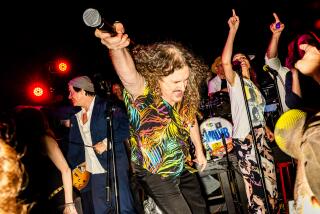With Lots of Food, Lots of Beer and the San Marino Dads Band, ‘What More Could You Want?’
- Share via
From the beginning, the San Marino Dads Band has been misnamed, loosely organized, a variety of sizes and distinctly unprofessional.
Despite all that, the band is beloved. And nobody loves it more than the people in it.
“This is what makes the day,” said clarinetist Alex Grant as he basked in the afternoon sun between numbers at a Pasadena Historical Society bash. “If they can’t afford a band and have lots of food and beer, we’re all happy.”
“Really, what more could you want?” asked trombonist Andy Campell, beaming at some of the party’s 300 guests. “This is a very elegant afternoon.”
It was a fairly typical engagement for the band: a couple of hours at a local benefit party, with five musicians wearing bow ties and straw boaters and playing some oldies in keeping with the party’s turn-of-the-century theme.
Even though they got no pay and only smatterings of applause, the musicians were delighted.
They will perform next for a picnic the Junior League of Pasadena will give for foster parents on Nov. 1, and during the holiday season they may have as many as three bookings a month. They come out in full force for every July 4 parade in San Marino, and for many years they have been invited to play for the annual Pasadena Showcase House of Design, presented by the Pasadena Junior Philharmonic Committee.
Sometimes they get “auctioned off,” meaning they volunteer to play for the highest bidder at benefit parties where goods and services are auctioned.
“They’re totally delightful,” said Lowry Ewig, chairman of the Junior League picnic. “I first heard them at a Polytechnic School family celebration, and when I asked them to play for us, they were incredibly gracious.”
Hugh Trotter, a business executive who works in Los Angeles, is the closest the band has to a manager. He makes the bookings, usually recruiting 5 to 10 musicians for each performance from a list of 75 who call themselves band members.
“The booking really depends on whether we can get a trumpeter,” said Trotter, himself a tuba player. “We don’t have many because that’s the hardest instrument, and we don’t have a band without a trumpet.
“We’ve been playing for some events for as long as 10 years,” Trotter said. “Sometimes we don’t get asked back. Mostly when that happens, those are real music lovers.”
Trotter and Campbell were among the first 16 to show up when the band was formed in the late 1960s and are two of only a few remaining from the original group.
They said the San Marino school district first tried to form the band and sent notes home with children asking for parents who could play musical instruments. Few of the notes reached home.
“Kids would be embarrassed to have their parents do something like that, so most of the notes got lost or something,” Trotter said.
Eventually, through the efforts of a few die-hards, the San Marino Dads Band took shape, although “most of us had not played for a long, long time and the first three trumpet players we never saw again,” Campbell said.
“The name was there before the band,” Trotter said. “It’s not exactly accurate.”
San Marino is a misnomer because Trotter’s list of 75 musicians shows that more than half live in other cities. Some come from as far away as Ventura and Chino for special occasions.
As far as “dads” go, the roster includes 15 women and several of the males are teen-agers who play for fun and experience.
“There are no auditions and no one gets kicked out, but there needs to be a certain level of competence,” Trotter said. Rehearsals are rare, except for the annual July 4 parade. There are no meetings, no officers and no dues.
The band’s repertoire includes turn-of-the-century music, Dixieland, German, Latin-American, Irish and Italian music.
“Once in awhile someone gives us a check for $25 and we always use it to replenish the band library,” Trotter said. “We always try to get better music and we’re all better players now than we’ve ever been.”
Trotter and Campbell are among those in a central core group who play for most of the events they’re invited to.
“It’s such a good release,” Trotter said. “Doing this for a couple of hours is totally different from what you’re usually doing.”
“Our problem is they ask us to play for one hour and we play for two,” said Campbell.
More to Read
The biggest entertainment stories
Get our big stories about Hollywood, film, television, music, arts, culture and more right in your inbox as soon as they publish.
You may occasionally receive promotional content from the Los Angeles Times.










